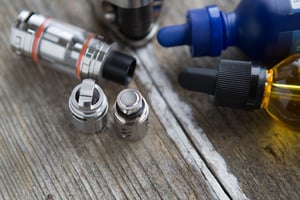Broughton announce new webinar.
What is Toxicology for ENDS
Toxicology

May 19, 2020 | Published by Yvonne Wilding
Toxicology, Nicotine
This article provides an overview of the different types of toxicological studies typically undertaken, and how they support regulatory submissions for ENDS products.
<br>
What is Toxicology for ENDS?Toxicology studies for Electronic Nicotine Delivery Systems (ENDS) products involves establishing which chemical compounds are present within a product (typically an e-liquid or a e-cigarette device) or are emitted by a product, and the level of safety concern posed by the level of any such compounds.
This article provides an overview of the different types of toxicological studies typically undertaken, and how they support regulatory submissions for ENDS products.
What is toxicological analysis?
Toxicological analysis is a scientific process designed to identify and measure chemical compounds present within a product’s ingredients, impurities or emissions. An important element of this is to confirm the level of such compounds, as exposure levels define whether there is a risk to user safety.
A wide variety of desk based, experimental and computational techniques are applied as detailed below.
Desk-based risk assessment
As its name suggests, this initial stage involves carrying out a systematic review of the latest, peer-reviewed literature available to assess any known risks posed by the chemical compounds within a product.
An important aspect of this is a stage called risk characterization, which involves:
-
identifying hazards
-
reviewing toxicity thresholds (i.e. the level at which a compound would start to have an adverse effect)
-
confirming exposure levels (i.e. measuring typical exposure levels delivered during usage)
In-vitro testing
In-vitro translates in Latin to “in glass”, and as such the name refers to tests carried out in a laboratory test tube scenario. Hazard assessment data is gathered through specifically designed experimental studies to rigorous standards which determine the effect of chemical substances within an e-liquid or from a device in the case of ENDS. Typical in-vitro tests include screening for mutagenicity, carcinogenicity and cell toxicity.
In-vivo testing
In-vivo testing refers to experimentation using a whole living organism. Animal studies are typically not carried out within the ENDS sector. However human subject studies (clinical studies) are required as part of many regulatory requirements to determine typical usage, behavioural effects, abuse liability and to perform a population risk-benefit assessment by comparing outcomes from ENDS products with those for combustible tobacco products.
Clinical Studies
Data obtained from human pharmacokinetic studies, behavioural assessments and topography studies are evaluated to determine levels of concern (if any) posed by exposure levels.
In-silico testing
This computational method involves utilizing specialist tools and software to predict and assess the risk associated with a chemical compound.
Information and data applied through such tools includes statistical modelling and expert review data.
Every regulation is different
Not all toxicological safety evaluation programs will include all the different types of studies. A tailored approach is most effective, based on the nature of the product and regulatory requirements. However, it’s worth pointing out that there is a high level of integration between the different studies undertaken, as data obtained from one study will inform and support further investigation within an alternative study.
Toxicology plays an important role in both new product development, and regulatory submissions to demonstrate the acceptability, safety and compliance of a particular product and ongoing product stewardship of commercial products.
Both clinical and non-clinical assessments are performed to GCP standard and are scrutinized and assessed by a team of accredited clinical scientists or toxicologists - sufficient to meet the most exacting of global regulatory standards.
Toxicology experts delivering an integrated study
Broughton operate exclusively in the ENDS sector and provide a range of toxicological strategies and studies to support ENDS manufacturers.
To discuss your toxicological requirements, contact our team to book a meeting so we can help you advance a smoke free future.



